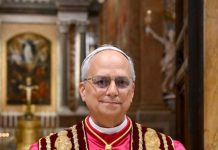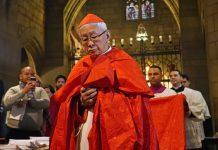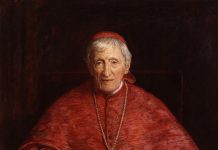From the Editor’s Desk (Thursday, November 17, 2016, Gaudium Press) Briefly put, the Holy Trinity is the belief that the one God subsists in Three Persons: God the Father, God the Son, Jesus (Who took on flesh in the incarnation and became Man), and God the Holy Spirit. They are all God, with the same divine attributes, yet are in relationship with each other as Subject and Object.
It is ultimately a deep mystery, because we can’t fully comprehend how three can be one. It seems to go against logic. Yet the Bible plainly teaches it, with many and varied proofs, and so we must accept the revealed doctrine in faith, bowing to the fact that God’s thoughts are much higher than ours (Is 55:9).
The Trinity is a classic case where there are few “direct” proofs, but many deductive or indirect proofs, which can hardly be dismissed by any person who accepts the inspiration of Holy Scripture: God’s revelation.
No single passage states, “The one God exists in three Persons: Father, Son, and Holy Spirit.” Yet, for example, we see a verse that strongly suggests the same, with just a little deduction:
Matthew 28:19 (RSV) Go therefore and make disciples of all nations, baptizing them in the name of the Father and of the Son and of the Holy Spirit,
If the Bible teaches that God (and only God) has certain characteristics, and proceeds to apply them to three Persons: called the Father, Son, and Holy Spirit, then they are all one God (since the Bible teaches there is but one: Dt 6:4; 32:39; Is 43:10; 44:8; 1 Cor 8:4-6).
In my research, I have found 40 passages that mention all three Divine Persons. Here are eight of them (just one-fifth of all):
Isaiah 61:1 The Spirit of the Lord GOD is upon me, . . . (cf. 61:2; Jesus applies this to Himself in Lk 4:16-30)
Luke 3:21-22 . . . when Jesus also had been baptized and was praying, the heaven was opened, [22] and the Holy Spirit descended upon him in bodily form, as a dove, and a voice came from heaven, “Thou art my beloved Son; with thee I am well pleased.” (cf. Mt 3:13-17)
John 15:26 But when the Counselor comes, whom I shall send to you from the Father, even the Spirit of truth, who proceeds from the Father, he will bear witness to me; (cf. 14:26)
Acts 2:33 Being therefore exalted at the right hand of God, and having received from the Father the promise of the Holy Spirit, he has poured out this which you see and hear. (cf. 7:55)
Acts 20:28 Take heed to yourselves and to all the flock, in which the Holy Spirit has made you overseers, to care for the church of God which he obtained with the blood of his own Son.
Romans 15:30 I appeal to you, brethren, by our Lord Jesus Christ and by the love of the Spirit, to strive together with me in your prayers to God on my behalf, (cf. Eph 2:18)
1 Corinthians 6:11 . . . justified in the name of the Lord Jesus Christ and in the Spirit of our God. (cf. 1 Pet 1:2)
2 Corinthians 13:14 The grace of the Lord Jesus Christ and the love of God and the fellowship of the Holy Spirit be with you all.
Is the Holy Spirit directly referred to as God? Yes; here is the best single passage along those lines:
Acts 5:3-4 But Peter said, “Anani’as, why has Satan filled your heart to lie to the Holy Spirit and to keep back part of the proceeds of the land? [4] . . . You have not lied to men but to God.” . . .
Ananias lied to the Holy Spirit; at the same time he lied to God; therefore the Holy Spirit and God are synonymous: one and the same.
This sort of thing occurs over and over in the Bible: equivalent characteristics in many respects are applied to all three Divine Persons:
1. Who raised Jesus from the dead? Well, it was God the Father (Gal 1:1; 1 Thess 1:10); it was also Jesus Himself (Jn 2:19; 10:17-18); and it was the Holy Spirit (Rom 8:11).
2. Who gave the new covenant? The Father (Jer 31:33-34); Jesus (Heb 8:1-13; 10:29; 12:24; 13:20); the Holy Spirit (Heb 10:15-17).
3. Who sanctifies believers? The Father (1 Thess 5:23); Jesus (Heb 13:12); the Holy Spirit (1 Pet 1:2).
4. Who is the creator? The Father (Gen 1:1; Is 44:24; Acts 17:24; Eph 3:9); Jesus (Jn 1:3; Col 1:16; Heb 1:8, 10); the Holy Spirit (Job 33:4).Job 33:4.
5. Who indwells believers? The Father (1 Cor 3:16a; 2 Cor 6:16; 1 Jn 3:24); Jesus (Jn 6:56; Rom 8:10; Eph 3:17); the Holy Spirit (Jn 14:16-17; Rom 8:9, 11; 1 Cor 3:16b).
The Bible even describes this in terms of different combinations: Father and Son (Jn 14:23); Father and Holy Spirit (Eph 2:21-22; 1 Jn 3:24); Son and Holy Spirit (Gal 4:6).
What one Person does, the others also do in complete agreement and unity, and the Persons “interpenetrate” each other. Christian theology has 50 cent words for this: circumincession (Latin) or perichoresis (Greek).
Lots of things are very difficult to understand, yet firmly believed; for starters: quantum mechanics, the physics of black holes, the nuclear fusion that occurs in the center of our sun, the “bending” of space and time (Einstein’s relativity). Physical reality has turned out to be very “weird” and unpredictable. Theology is also sometimes striking, and seemingly “odd” and unfathomable. This should not surprise us at all (since God is an extraordinary Being).
Cumulative arguments based on scores of individual indications become very compelling: much as a large rope, consisting of many individual strands woven together is exceedingly strong. Such is the nature of biblical indications for the Holy Trinity. We find them at every turn. No one should be led astray to think that the Holy Trinity is not “biblical.” Having seen the many reasonable proofs, we believe in faith.
Source National Catholic Register/ Dave Armstrong





































